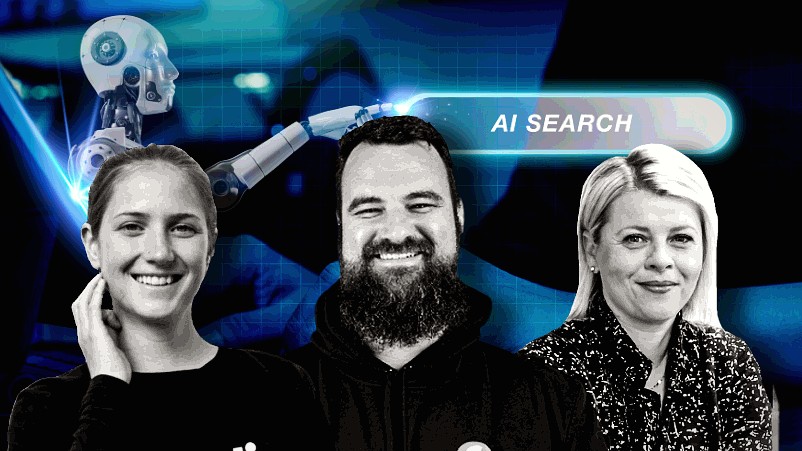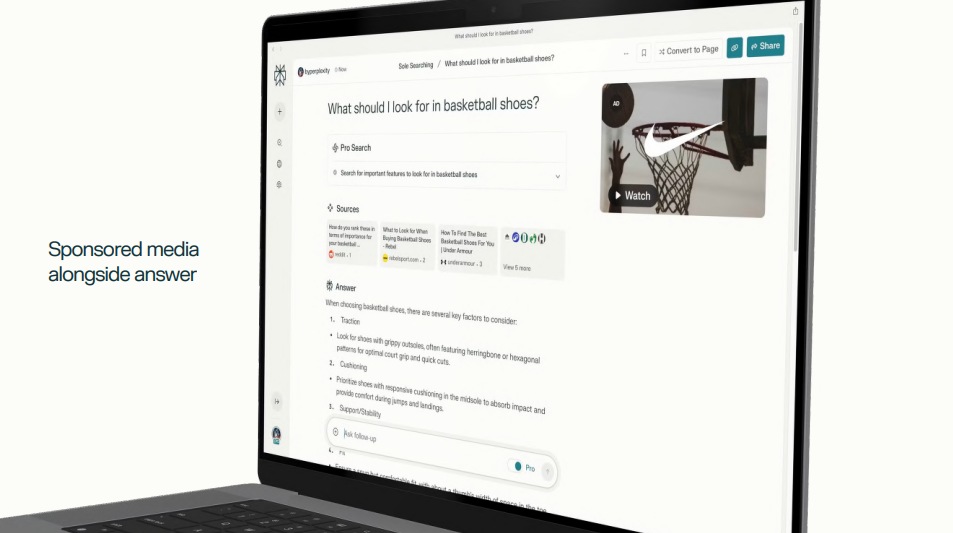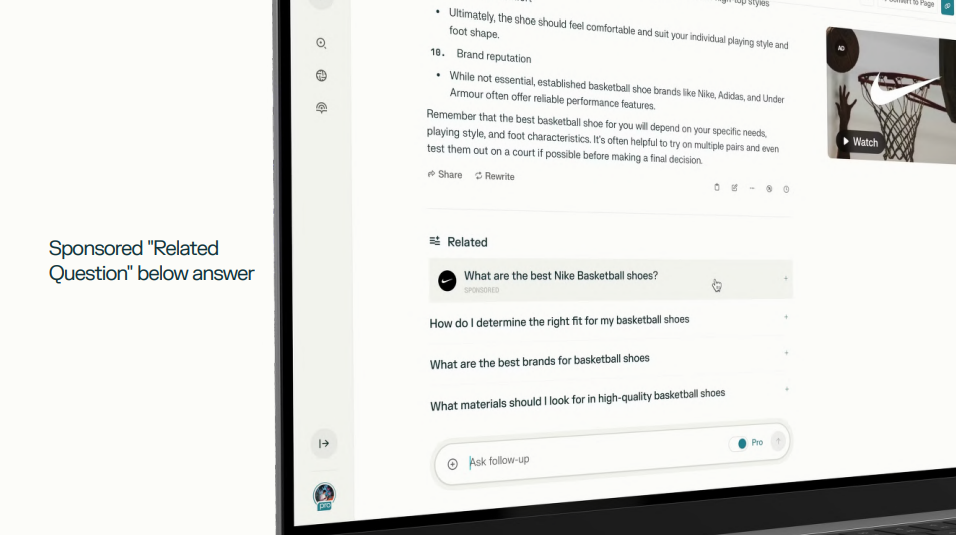AI’s search spill: Agencies race to reverse engineer bot results, influences as SEO market faces new word order

New keyword order (L-R): Andi Search CEO Angela Hoover, Resolution Digital GM SEO product innovation David Castle, Hotwire global CEO Heather Kernahan.
The race is on to crack AI search before brand and publisher rankings slide. The latest version of Google's AI Overviews has Resolution Digital's David Castle optimistic that the SEO wheel won't need to be completely be remade when it lands in Australia within the next six months, with Google already testing AI Overviews ads in the US – but Castle fears deciphering chatbots will prove more difficult. Hotwire CEO Heather Kernahan claims the firm has managed to reverse engineer where AIs are pulling from and what’s influencing them – but it’s early days and only in testing with a handful of clients. Meanwhile, a new generation of search upstarts are eschewing the ad-funded model entirely: Andi Search CEO Angela Hoover suggest ads would lead to her platform's "ultimate destruction". But that’s what Sergey Brin and Larry Page once said. Perhaps they were wrong on the timing.
What you need to know:
- AI is coming for search and the race is on to crack the code before brand and publisher rankings slide.
- Traditional SEOs having been testing and measuring how search terms perform on Google's AI Overviews. Resolution Digital's David Castle reckons it might not be the complete upending foretold by early research.
- However, AI chat bots are another story – unless they're citing sources, reverse engineering a new methodology is difficult.
- Enero Group tech communication agency Hotwire is trying to demystify the back end of LLMs with a new generative AI optimisation technology its coined GAIO.
- It's still in beta mode, but global CEO Heather Kernahan the agency is able to identify key "influencers" on certain search terms and is helping clients to test and measure new content strategies accordingly.
- While Google is looking to safeguard its share of the $300 million paid search market it's not the only one looking to get a head start – newcomer Perplexity AI has been pitching advertisers on a suite of new advertising products set to land on its generative search platform in Q4, stepping up commercial discussions and bidding to get the likes of Nike and Marriott to put search dollars into a sponsored question and AI-generated answer format.
- But not everyone is onboard. OpenAI's Sam Altman has snubbed the entire concept of ad-funded search as "dystopic" and Andi Search chief Angela Hoover likewise suggests tarnishing search quality with ads would lead to her platform's "ultimate destruction".
- With Google's search monopoly facing unprecedented scrutiny via the DoJ's antitrust suit, Hoover reckons there's an opportunity for startups to show the market there's a better way.
[In AI Overviews] 80 per cent of the time one or more of the links that's featured is consistent with the top three ranking results, and half the time it is the top-ranking result ... [So] if you rank well within the SERPs (search engine results pages) then you will be featured within AI Overviews, or at least cited.
Searching questions
The days of search as we know it may be numbered and brands, publishers and agencies are grappling with what to do about it.
In February, Gartner predicted that traditional search engine volumes would drop 25 per cent by 2026 due to the rise of AI chatbots and other virtual agents.
Bing was the first mainstream search engine to integrate AI into queries and since then Google has reacted, with literally mixed results. How hard Google pushes AI Overviews remains to be seen, but early research from Authoritas has suggested it will cannibalise organic search terms by as much as 90 per cent while potentially pushing brands and publishers off the first page entirely. (Authoritas CEO Lawrence O'Toole thinks Google will ultimately go full throttle: "It’s the future of search. It will be pervasive eventually and this is just the start point of generative content in the search results," he recently told Mi3.)
Resolution Digital GM of product innovation, David Castle, says Google's AI Overviews is expected to land in this market within the next six months – and the race is on to decipher a strategy from US and UK case studies. The Omnicom-owned agency has been working backwards to figure out what an AI Overviews optimisation methodology looks like – and he admits it’s still a work in progress.
SEO vs AIO
Castle says that AI Overviews’ predecessor, Search Generative Experience – or SGE – “was looking like it was going to be far more broad content-based than we'd ever really had to deal with before”. Meaning, brands would need to revise their content strategies to go “broad and shallow” as well as the usual “deep and narrow” approach.
“93 per cent of the links in the initial tests in SGE weren’t related to the top-ranking pages, so it looked like it was going to be a completely different animal to traditional search,” he tells Mi3.
But since the limited overseas launch of AI Overviews in May, Castle says traditional optimisation practice has been back on the cards.
“[In AI Overviews] 80 per cent of the time one or more of the links that's featured is consistent with the top three ranking results, and half the time it is the top-ranking result.”
That’s to say: “If you rank well within the SERPs (search engine results pages) then you will be featured within AIO, or at least cited within AIO”.
Which suggests some of the predictions of wholesale changes and effective holing of traditional SEO strategies may be wide of the mark – at least for now.
But it’s not just Google industry must get to grips with. Purpose-built AI search engines from the likes of Microsoft and Perplexity are already used en masse globally, as are searches within internet-enabled large language models (LLMs) like OpenAI’s ChatGPT.
According to Castle, it’s the latter that are proving a lot more difficult to figure out.
LLMs as search engines
“Traditional search engines are a relatively known entity. We understand how they crawl, index, and process that information, and more or less what they're looking for as their quality markers,” per Castle. “Whereas, when we look at new additions like Gemini as a chat platform, or ChatGPT on the Open AI side, less is understood about how they're picking and choosing their information.”
“The other side of that is, naturally, when you're interacting with ChatGPT, it's not actually citing any sources for you – it's just providing itself as the source of truth.”
Despite the relative opacity of content ranking systems within LLMs, Castle reckons SEO pros will be the first to crack the code – not least because of the genuine threat they pose to traditional search engines, and therefore a lot of digital marketing agency business models.
“I think the moment that we start to see citations or indications that these responses have come from other sources, the community will very quickly be able to work backwards and reverse engineer and understand how they're selecting that information.”
Once that’s clear, he says SEOs will have a checklist for what content needs in order to be “chosen” by the bots.
A question of influence
Some claim to have already made some early headway. According to Hotwire CEO Heather Kernahan, when LLMs became widely available in 2023, the missing puzzle piece was figuring out “who was influencing the chatbots” – i.e. where they were getting their source content.
By the year end, she claims Hotwire had established a model that could reverse engineer an AI search strategy via a bespoke design layer that sits on top of the LLM and can access the source content that’s been drawn on.
“When we asked very specific brand questions, like ‘which headphones would you recommend for a gamer’, we started to see some very specific realms of influence,” explains Kernahan.
Client feedback on the tech was so strong that Hotwire turned the experiment into a new product dubbed GAIO – short for generative AI optimisation.
The interface is internal, and Kernahan describes delivery as “technology coupled with consulting”. The agency will use GAIO to derive insights on who is influencing sentiment or reach for certain search terms or questions within the LLM platforms and turns them into strategy plans for clients.
The platform is dynamic, but Kernahan says for most clients the best approach is a periodic snapshot, where they can ask a key brand question at the start of a quarter that will shed light on who is influencing their buyers, and then circle back a quarter or two later “when they have a chance to implement some strategies around it”.
But it’s still early days. Hotwire has around half a dozen clients in beta testing with the GAIO tech, and Kernahan says it’s too soon to have hard business results to show for it.
“It's a lot of introduction – it's having people think about what this could mean for the future of search, for their organisation and their brand strategies and campaigns, and start to play with it and see what results come over time.
“I really believe in tentative goals, and when I say tentative goals, I mean I believe in setting some hypothesis around what this can do and then with our brands together, testing that out to see if it actually happens or not.”
Next gen search ads
While the race is on to hack organic AI search rankings, there’s been less noise on the advertising front. That was, until recently, when reports emerged that Perplexity is pitching advertisers on a suite of ad products set to launch in Q4, with the likes of Nike and Marriott reportedly being courted.
The generative AI search engine is the first major standalone AI player looking to take its slice of the US$300bn search advertising market.
According to a pitch deck obtained by Adweek, advertisers will be able to sponsor ‘related questions’ that appear at the bottom of search results, or run video ads in prominent positions. per that deck, Perplexity’s advertising package will initially target 15 key categories including health, technology, finance, arts and entertainment, and food and beverage, and will include off-site deals on third-party publisher sites, starting with those in its publisher revenue share program, including the likes of Fortune and Time.
Of the other pureplays, OpenAI boss Sam Altman has been at best noncommittal on the future of the company’s search prototype, SearchGPT.
Speaking on a podcast with Lex Fridman in March, Altman describe the concept of ad-supported AI search as “dystopic” and less trustworthy than the subscription-based model currently employed for ChatGPT.
“I like that people pay for ChatGPT and know that the answers they’re getting are not influenced by advertisers,” he told Fridman. “I’m sure there’s an ad unit that makes sense for LLMs, and I’m sure there’s a way to participate in the transaction stream in an unbiased way that is okay to do, but it’s also easy to think about the dystopic visions of the future where you ask ChatGPT something and it says, “Oh, you should think about buying this product,” or, “You should think about going here for your vacation,” or whatever.”
When pushed he didn’t go as far to “completely throw out ads” – “I’m not saying that. I guess I’m saying I have a bias against them.”
Google obviously has no such qualms. It confirmed at its upfronts in May that Search and Shopping ads were on their way to AI Overviews, with testing underway in the US.

An example of sponsored media opportunities shown on Perplexity's pitch deck Pic: Adweek

An example of sponsored 'related questions' shown on Perplexity's pitch deck Pic: Adweek
Ads vs ethics
Altman’s not the only one with a negative outlook on ad-supported search. Others likewise see it as a key differentiator, and disruptor, to Google's monopoly – and Andi Search is one.
The business, a scion the same startup accelerator that backed Airbnb, Doordash, Dropbox and Twitch, was founded in 2021 by then 23-year-old Angela Hoover and Australian tech editor turned entrepreneur Jed White.
Hoover, the startup’s CEO, tells Mi3 the duo had been driven by their frustration with the declining quality of Google’s search results – with search ads and SEO spam the key culprits.
“They're not a search company anymore. They're an ad tech company with a browser monopoly, and they pay over $30 billion a year to maintain that browser monopoly,” per Hoover.
The idea for Andi was to create a highly accurate, ad-free alternative that would engage users in a chat-style feed of results. Its anti-advertising stance, as Hoover points out, is not dissimilar an infant Google.
“Back in the early days when Google got started, they actually wrote a white paper about how if they served up advertising on their platform, that would be like the death of them in the end,” she says.
(It's true: In a 1998 Stanford paper The Anatomy of a Large-Scale Hypertextual Web Search Engine, Larry Page and Sergey Brin wrote that they "expect that advertising funded search engines will be inherently biased towards the advertisers and away from the needs of the consumers". As well: "We believe the issue of advertising causes enough mixed incentives that it is crucial to have a competitive search engine that is transparent and in the academic realm". How time flies, and both Page and Brin now have a net worth north of $100bn.)
With ads out of the picture – though the platform has experimented with affiliate links – Andi’s plan is to monetise via a ‘freemium’ approach that will include paid enterprise tiers and free access for individual users.
The startup also has a publisher revenue share on its wish list, where partners will be paid a share of monthly subscription revenues every time a user clicks out to their content. That, suggests Hoover, will incentivise “high quality journalism” because “the ranking factor has to do with who's got the best content, not who's paid the most or stuffed the most SEO keywords in their article in order to rank”.
Death by a thousand cuts?
It's an optimistic approach, and the firm will likely have to contend with investors who may be less so. Hoover though is confident they’ll be able to resist pressure to revert to advertising.
“If we were to start running advertising on Andi's platform, we would be generating tens of thousands of dollars in revenue by tomorrow. But the problem is that [advertising] leads to your inevitable destruction – because you're tarnishing the quality of the search results,” she says. “That's why there's an opportunity to disrupt Google now, because it's become so bad with ads and SEO spam.”
Attempting to dislodge a $300bn incumbent may seem futile. But Google managed the equivalent when overthrowing first Ask Jeeves, which in 2000 was processing 500m search terms per month to Google's 18.5m, before taking out Yahoo and relegating Bing to a bit part player.
Disrupting the behemoth may be plausible if US legislators succeed in a concerted push to break up the Google monopoly. Per Hoover: “I think that if they hadn't had this antitrust DoJ [Department of Justice] ruling then potentially they could just keep throwing money [to maintain their share]. But now, because they're actually getting cracked down on from a federal level, it could open up opportunities for startups.”
There's no shortage of startups vying to take a cut. In the meantime, publishers, brands and their SEO agencies have plenty of work cutout trying to keep up with what Google and the big LLMs decide to do next – with a tonne of money riding on it.



